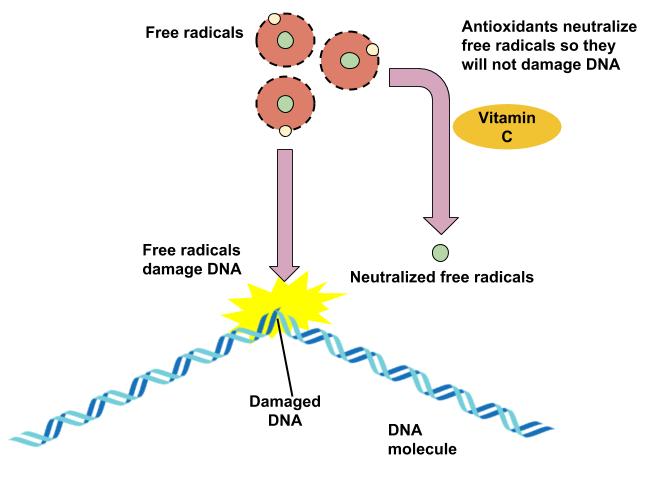10.5 – Antioxidants and Supplements
Learning Objectives
- Evaluate the use of antioxidants and supplements with respect to their potential benefits and risks to health.
The market is flooded with advertisements for “super antioxidant” supplements teeming with molecules that block free radical production, stimulate the immune system, prevent cancer, and reduce the signs of aging. Based on the antioxidant-supplement industry’s success, the general public appears to believe these health claims. However, these claims are not backed by scientific evidence; rather, there is evidence suggesting some supplements can actually cause harm. While scientists have found evidence supporting the consumption of antioxidant-rich foods as a method of reducing the risk of chronic disease, there is no “miracle cure”; no pill or supplement alone can provide the same benefits as a healthy diet. Remember, it is the combination of antioxidants and other nutrients in healthy foods that is beneficial. In this section, we will review how particular antioxidants function in the body, learn how they work together to protect the body against free radicals, and explore the best nutrient-rich dietary sources of antioxidants. One dietary source of antioxidants is vitamins. In our discussion of antioxidant vitamins, we will focus on vitamins E, C, and A.

Antioxidant Chemicals Obtained from the Diet
There are many different antioxidants in food, including selenium, which is one of the major antioxidants. However, the antioxidants you may be the most familiar with are vitamins. The “big three” vitamin antioxidants are vitamins E, A, and C, although it may be that they are called the “big three” only because they are the most studied.
| Antioxidant | Functions Attributed to Antioxidant Capacity |
|---|---|
| Vitamin A | Protects cellular membranes, prevents glutathione depletion, maintains free radical detoxifying enzyme systems, reduces inflammation |
| Vitamin E | Protects cellular membranes, prevents glutathione depletion |
| Vitamin C | Protects DNA, RNA, proteins, and lipids, aids in regenerating vitamin E |
| Carotenoids | Free radical scavengers |
| Lipoic acid | Free radical scavenger, aids in regeneration of vitamins C and E |
| Phenolic acids | Free radical scavengers, protect cellular membranes |
Should you take a Supplement?
As you have read, certain groups of individuals may need a supplement due to their unique nutritional needs. Women contemplating pregnancy are advised to take folic acid supplements. A physician will recommend that individuals with iron deficiency anemia take iron. The supplement industry is worth more than $40 billion and is comprised of between 50,000-80,000 unique products. 1 The industry is not regulated in the same manner that pharmaceuticals are regulated. The supplement industry is regulated by the following Act:
Dietary Supplement Health and Education Act of 1994 (D.S.H.E.A.)2:
- Manufacturers and distributors of dietary supplements and dietary ingredients are prohibited from marketing products that are adulterated or misbranded. That means that these firms are responsible for evaluating the safety and labeling of their products before marketing to ensure that they meet all the requirements of D.S.H.E.A. and FDA regulations.
- FDA is responsible for taking action against any adulterated or misbranded dietary supplement product after it reaches the market.
Note that the industry is expected to self-regulate and the FDA is responsible AFTER the product is released. As you can imagine, this act protects the manufacturer and means that you must be responsible to research whether the product is safe and effective.
Ask these questions before taking a supplement:
- Do you need a supplement? Have you been told by your health care provider to take a supplement? Could you obtain the needed nutrient from food with a supplement?
- Does the available science support the claims made regarding the supplement?
- Has the manufacturer submitted to third-party verification of their product? Look for this verification on the bottle or on-line.
- How well will the particular supplement work and is it safe?
- Are there any precautions you need to know about or interactions that may occur with other medications you are already taking?
- Visit the Office of Dietary Supplements website. This office is part of the National Institutes of Health.
- Labdoor.com and consumerlab.com are third-party independent groups that assess the quality of supplements. Check out their information before you buy.
- Read this article from the NIH
- Visit this FDA website to learn about recalls and what is new regarding dietary supplements.
Remember, getting your nutrients in food is superior to taking supplements!
1 https://www.fda.gov/news-events/press-announcements/statement-fda-commissioner-scott-gottlieb-md-agencys-new-efforts-strengthen-regulation-dietary Accessed May 29, 2019
2 https://www.fda.gov/food/dietary-supplements. Accessed May 29, 2019
Contributors
The University of Hawai’i at Mānoa Food Science and Human Nutrition Program: Allison Calabrese, Cheryl Gibby, Billy Meinke, Marie Kainoa Fialkowski Revilla, and Alan Titchenal

